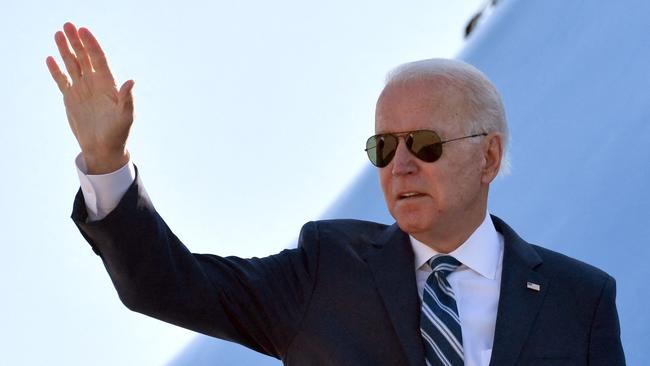Canberra ‘barely in loop on Biden’s Afghan exit’, says Republican
The Morrison government was barely consulted before the US decided to withdraw troops from Afghanistan last month, according to a US congressman.

The Morrison government was barely consulted before the US decided to withdraw troops from Afghanistan last month, according to the leader of a US congressional group dedicated to closer relations with Australia.
Mike Gallagher, a rising star in the US Republican Party and co-chairman of the bipartisan Friends of Australia Caucus in the US congress, said the Biden administration’s withdrawal decision on April 14 did a “disservice to some of our closest allies”.
“As I understand it, [they] weren‘t fully consulted on the front end of the decision, including Australia,” Mr Gallagher told The Australian.
President Jose Biden announced the end of the longest-running war for the US last month after two decades and the deaths of 2400 US military personnel and tens of thousands of Afghans.
“After consulting closely with our allies and partners, with our military leaders and intelligence personnel, with our diplomats and our development experts, with the congress and the Vice-President, as well as with [Afghan President Ashraf Ghani] and many others around the world, I concluded that it’s time to end America’s longest war,” Mr Biden said at the time.
Republicans in congress, including Mr Gallagher, criticised the decision.
“I worry that this business of setting the artificial deadline of 9/11 for withdrawal, withdrawal just gives a huge public relations victory to the Taliban,” Mr Gallagher said.
Following the US decision, Scott Morrison announced the remaining 80 Australian military personnel, down from around 1500 at its peak, would leave Afghanistan by September.
Forty-one Australians died in the conflict.
“Australia continues to support the negotiations between the Afghan government and the Taliban,” the Prime Minister said at the time.
“We encourage both parties to commit to the peace process that so many Australians have died to provide for.”
US troops on the ground have begun their gradual withdrawal, with the process expected to be complete by September 11 this year, two decades after the attack on the twin towers in New York and the Pentagon, although some military officials expect the exit could be more rapid.
“I still have unanswered questions about the extent to which our allies were involved with the decision to withdraw, and going forward we need to ensure we are acting in lock-step with our allies like Australia,” Mr Gallagher said.
Foreign Minister Marise Payne visited Washington DC last week, the third foreign minister to visit the US capital since Mr Biden was sworn in earlier this year, to meet US Secretary of State Antony Blinken, in part to discuss the future of Afghanistan without US, Australian and British troops.
Foreign policy experts worry the absence of an allied military presence will destabilise the region.
“Our Australian mates have played a critical role in coalition efforts in Afghanistan,” Mr Gallagher said.
The Australian understands the level of consultation with Australian officials was limited and close to the date of the April 14 decision.
“We cannot continue the cycle of extending or expanding our military presence in Afghanistan, hoping to create ideal conditions for withdrawal, and expecting a different result,” Mr Biden said.
He added there was no longer any justification to believe a longer presence would create a stable democracy in the Central Asian republic.
Former president Donald Trump had also indicated he intended to withdraw the remaining US troops, whose presence was costing the US government more than $US20bn a year.




To join the conversation, please log in. Don't have an account? Register
Join the conversation, you are commenting as Logout